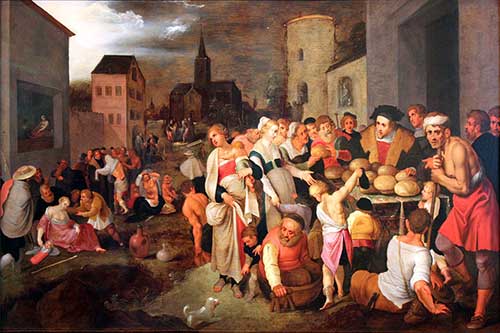This coming Sunday (11 October), Roman Catholics and Anglicans/Episcopalians again share a common collect. I am working on producing a full set of shared collects for the church year. My work so far can be found here: Book of Prayers in Common. My rendering for this coming Sunday and the week following is:
Let us pray (in silence) [that we may know God’s love and grace before, in, and after anything we do]
Pause
Lord, [or Lifegiving God]
we pray that your grace may always precede and follow us,
that we may continually be given to good works;
through Jesus Christ
who is alive with you,
in the unity of the Holy Spirit,
one God, now and for ever.
Amen.
The original is:
Tua nos, Domine, quaesumus,
gratia semper et praeveniat et sequatur,
ac bonis operibus jugitur praestet esse intentos…
I provide a commentary here.
If you appreciated this post, consider liking the liturgy facebook page, and/or signing up for a not-very-often email, …
image source: Frans II Francken: The Seven Works of Mercy, 1605, German Historical Museum Berlin




In discussing your apparent fondness for Romanism, in part at least, for with a retired Anglican minister he lent me a book about the Oxford Movement within the Anglican Church. His copy is dated 1931 but it appears the original was written in 1875 or thereabouts. I thought the book may explain your position.
Are you aware of this term, that it has been debated within the Anglican movement and the desire for some within the Anglican to draw close to Rome?
The book was a good read as it drew very clear theological distinctions between the Anglicans and RC’s despite some superficial, at a glance, similarities. I’m increasingly of a view that Anglicans and RC’s are chalk and cheese with there being much within the RC style and theology that Anglicans should find uncomfortable.
You comments generally appear enigmatic to me, Brown. And when I or others respond to or seek elucidation from you there tends to be no further explanation or comment from you. Your request whether I am aware of “this term” is such. Which term are you referring to? Romanism, the Oxford Movement, or your unnamed book?
If you are genuinely interested in engaging in conversation, please go back and respond to some of the comments made in response to you; click to receive the replies, or the impression that you are giving is that you are a troll.
This particular post is about the prayer that the majority of Christians will be using this coming Sunday – a discovery that I am not sure anyone else has made. I am not sure that an unnamed book published between 1875 or thereabouts and 1931 really explains my position on this.
Blessings.
I regret that I have given such a negative
impression Bosco and had no desire to offend.
In the desire to seek truth and to hold to the centrality of Christ I was struggling with the various theological positions held by branches of mainstream Christianity and looking to understand how the these differences could be reconciled – if in fact they should be. The prayers of Anglicans and RC’s was set out by you and it seemed opportune to ask about the distinctions as well as the similarities hence my looking for answers to a position I did not really understand. While I may disagree with you about some things because I do yet understand the position you hold I’m not a troll. I will reconsider my approach and thank you for making your position clear.
Thanks for the response, Brown.
People in the community around this site certainly do not need to agree with each other. I think it best to respond to the particular expressed point of a post, rather than your search for some sort of “position” that I may or may not hold that is not expressed explicitly in the particular post.
If such is helpful, the “about” for this site may help you.
I have a passion for the collect form, going back to the early church, as a way of leading into worship. That these early-church prayers, from well before the divisions in Christianity that you mention, are used today by different denominations, the same prayer on the same day, was a discovery by me that I cannot find anywhere else.
Blessings.
I love this prayer! Thank you for sharing it and for sharing your insightful comments on it. Also, I love that you always focus on the similarities between the various Christian Denominations. I was raised Catholic and I am bringing my boys up in the Catholic church, but I identify myself as a Christian – In the end, we are all just taking different paths to the same place!!! I hope your Mass goes well tomorrow!!!
Thanks for your encouragement, Jen. Let us pray for each other, online and offline ministries, and the communities that gather around websites. Blessings.